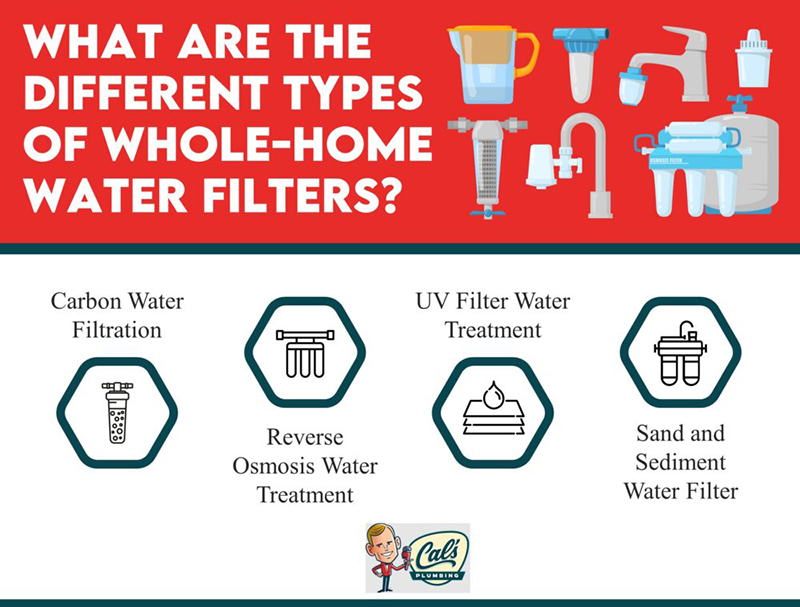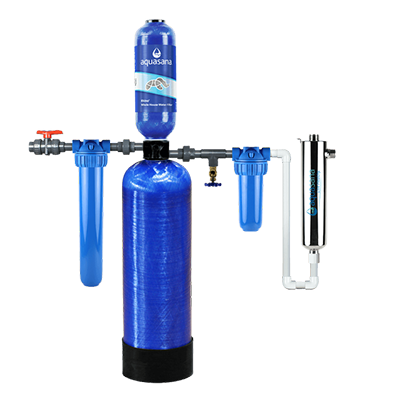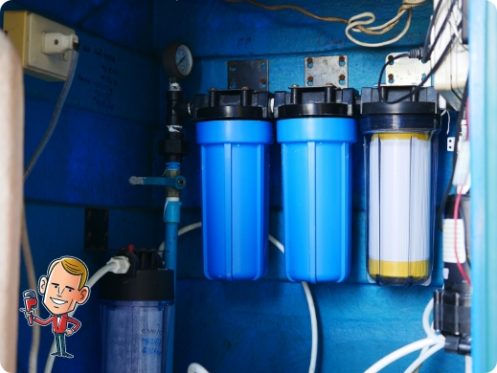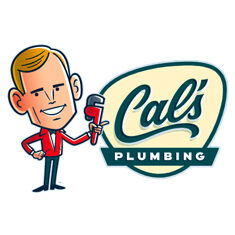Summers can get extremely hot in Arizona, and a glass of ice water is always refreshing. However, tainted water is an inconvenient fact that all residents in Arizona and most property owners must cope with. Water may contain pollutants such as minerals, chemicals, and other contaminants that give it a poor odor and flavor. Some of these pollutants can harm your health, mainly if they include tiny organisms and germs that can lead to life-threatening illnesses. So, how do you choose the right water filter for your home?
How Can Filters Be Used?
Water filtration can help cleanse water by eliminating harmful contaminants, making it safe to drink, and frequently enhancing its flavor. Additionally, water may contain high levels of calcium and magnesium, resulting in hard water. Fortunately, there are many distinctive and excellent whole water filtration systems today. Let’s learn a little more about the process.
Most home water filters can filter out particles as tiny as 0.35 microns. Some filters are developed to clear the water of iron, chlorine, and heavy metals. In addition, water softeners, UV light purifiers, and several other unique devices are included in specific systems that help thoroughly cleanse the water.
As you can expect, the cost of a water filtration system will rise as it includes more features. You may wonder if you need a complex water filtration system. Have your water tested first to see what contaminants it contains.
What Are the Different Types of Whole-Home Water Filters?
In Tucson, Cal’s Plumbing, can help you choose the best filter for your home. Whole-home water filters have a lot of advantages for plumbing and water quality, aside from being healthier and better for the environment. It can provide safe drinking water, extend your plumbing appliance duration, and it is cost-efficient.
Carbon Water Filtration
Right now, the leading contenders in the water filtration market are activated carbon filters. Perhaps this is due to their unique qualities and effectiveness in removing up to 99% of pollutants from drinking water, including heavy metals, silt, volatile organic compounds (VOCs), total suspended solids (TSS), chlorine, and chloramines.

Activated charcoal filters, commonly called carbon filters, are distinct from regular water filters. As an alternative, they are made of tiny black beads or a solid, porous black sponge that has undergone further processing to improve its ability to trap specific contaminants. The surface area is first significantly increased by heating, steaming, or injecting chemicals into the carbon, which produces millions of tiny holes. The carbon is more effective as a filter media due to this activation process, which increases the number of holes available for the carbon to catch and absorb a wider variety of pollutants.
Reverse Osmosis Water Treatment
One of the more often used options for drinking water filters is a reverse osmosis water treatment. From a straightforward purifying procedure to a more intricate, multi-step impurity removal procedure, reverse osmosis pushes water through a membrane that is semipermeable. This purges drinking water of pollutants and toxins. This makes it one of the most effective water filtering systems for eliminating pollutants and leaving behind just oxygen and essential minerals.
UV Filter Water Treatment
UV filters expose water to ultraviolet light, which kills various microorganisms that might be potentially harmful to your health. In addition, UV filters can work without extra heat or chemicals; it’s a popular option for those who care about the environment.
A UV filtration is efficient in protecting against bacteria, viruses, and other pollutants often found in private well water because it was mainly created for well water pollution. By eliminating up to 97% of the chlorine in conventional tap water and lowering dangerous water pollutants, you can get pure, great-tasting water from every tap in your house. UV filtration can remove pollutants, such as pesticides, herbicides, rust, silt, sediment, water soluble metals, and industrial solvents.
Sand and Sediment Water Filter
Sand, silt, grime, and rust may all be captured and removed from water using sediment filters. In addition, a sediment filter can safeguard a water treatment system (such as a water softener or UV water sterilizer) and water-using appliances by eliminating these particles from water.
Sediment filters are a barrier against grit and particles that can harm your water filtration system, block household pipes, and shorten the lifespan of some of your appliances that use water, such as your dishwasher.
By preventing UV light from penetrating the bacteria that cause waterborne illnesses, sediment can also impair the effectiveness of a UV water filter system. Additionally, if the sediment is not removed through filtration before installing whole-house water softening, sand or silt may enter the system and scrape and harm the softener’s delicate moving components.
Notable Water Filters for Homes in Arizona
Aquasana Rhino® Well Water with UV Model #EQ-WELL-UV-PRO-AST
The Aquasana has several fantastic add-ons and a sophisticated filtering mechanism. A pre-filter, a filter, and a post-filter are included with this model. While activated carbon eliminates herbicides, pesticides, PFOA/PFOS, VOCs, and other chemicals, chlorine and heavy metals are also reduced by the filter.
The UV filter in this model, which has been created especially for well water, assists in preventing the growth of bacteria, viruses, and other impurities. In addition, to avoid buildup, Aquasana now offers a salt-free water filter as an add-on. As a result, you won’t need to buy salt pellets or worry about salting the environment.

SoftPro Water Systems Whole-House Upflow Catalytic Carbon Filter
The catalytic carbon filter used by SoftPro’s water filter removes metal particles, chloramine, and 99% of pollutants in addition to many other impurities. It has a one million gallon filtration capacity and a seven to ten-year estimated life.
Homeowners who care for the environment will find SoftPro’s filter a preferred solution because it doesn’t generate wastewater or require any power.
3M Aqua-Pure™ AP900 Series Model #AP904
The statistics are astounding with the 100,000-gallon filter capacity and 20 GPM flow rate of 3M’s Aqua-PureTM AP904 whole-home water filter. Additionally noteworthy is the 25-year warranty.
Whirlpool Central Water Filtration System Model #WHELJ1
This Whirlpool filtration system’s main selling point is the lifetime filter. To save the need to buy filters all year long, the system will self-clean every two weeks at a predetermined period. While other filtration systems can remove additional impurities, this type is excellent at removing silt and chlorine. It can handle a flow rate of 6 GPM, which is sufficient for a typical home but not as high as other filtering systems.
Express Water Heavy Metal Whole-House Water Filter Model #WH300SCKS
This Express whole-house NSF/ANSI-certified water filter provides the rigidity necessary for larger houses and is quite simple to operate. There shouldn’t be a significant drop in water pressure with a 15-gallon-per-minute flow rate. The filters last around six months or 100,000 gallons.
The best water filter will depend on your specific needs, the size of your home, and how much water you use daily.
How We Can Serve You
At Cal’s Plumbing, we have been a family-run company and have offered outstanding service since we opened for business in 1948. We have years of experience passed down for generations, so you can count on us to promptly and efficiently handle any plumbing problems. We specialize in plumbing installations, drain repair and cleaning, hydro-jetting, and water filtration services. If you need reliable and experienced plumbing services in Tucson, Arizona, contact Cal’s Plumbing.
Other Popular Blogs:How to Increase the Hot Water Output in Your Home
10 Simple Ways to Unclog Your Drain
How To Avoid Tree Roots In Water Pipes






